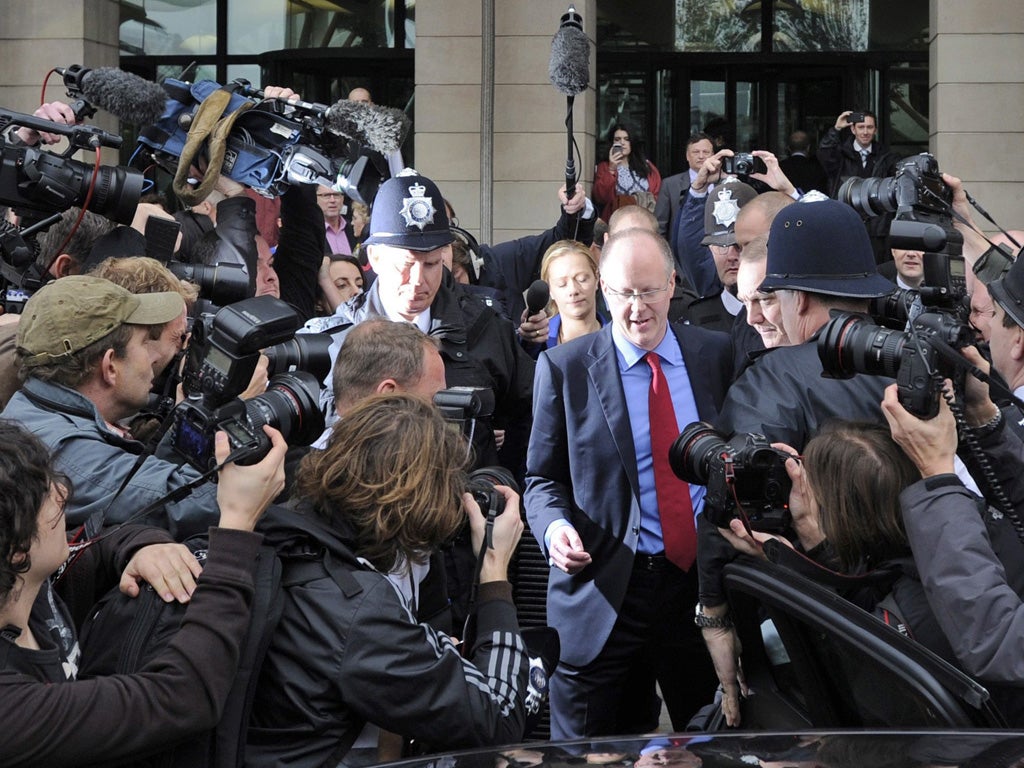Jeremy Paxman is wrong: Newsnight's errors were the product of shoddy journalism, not budget cuts
The failures of Newsnight have nothing to do with budget cuts. Even the least well-funded local newspaper would have done better than this

John Simpson is an old friend and Jeremy Paxman a man whose journalism I have always admired. So it is with regret that I say these two great broadcasters have lost it when they attribute to cuts in the BBC’s programme-making budget the fiasco of Newsnight’s outrageous linking of an innocent man to child abuse. Let’s be clear: the broadcasting of such allegations, based on the unsubstantiated word of a deeply damaged individual, without even an attempt to talk to the person accused, had nothing to do with “cuts on programme budgets”, as Simpson and Paxman protest. The least well-funded local newspaper would have done better than this.
Speaking of newspapers, those of us still in the tree recycling business, whose revenues really have been cut savagely, view with amazement the moans of very well remunerated BBC personnel at the fact that the licence fee has merely been frozen – at a not insignificant £3.6bn a year.
Besides, other catastrophic misjudgements in BBC journalism occurred before the freezing of the licence fee. It was back in 2001 that BBC News had to apologise at vast length for having accused a leading shareholder in an international diamond business, Mohamed Khalfan, of being part of the al-Qa’ida campaign of bombing US Embassies in Africa. It was another case of “mistaken identity”. The actual terrorist had been a different man of the same name; again the BBC “investigation” never got round to talking to the blameless company executive in question.
It is certainly true that all newspapers – and I myself as an editor of one – have made terrible misjudgements. Without making excuses for my end of the trade, this can happen because of the intense competiveness of newspapers: we rush stories out before they are ready, fearful that otherwise a rival will get there first. The BBC, however, is not subject to competitive pressure in the same way. Its income is guaranteed by statute; and the whole point of the Corporation’s journalism is – or should be – that it is reliable and trustworthy: not sensationalistic or shoddy. If it becomes both of those things, why should the public be forced by law to purchase it, via the licence fee?
I should add that I am a daily viewer of Newsnight and a devoted listener to the Today programme, whose John Humphrys interview on Saturday with the unfortunate George Entwistle was BBC journalism at its most impressive: so I want the best for the world’s leading newsgatherer. The good news is that this is a problem easily dealt with: it just requires an editor-in-chief with grip and the ability to communicate to his or her troops the message that maintenance of trust must always come before the often tendentious properties of scoops and so-called investigative journalism.
Where to set the bar?
The earlier Newsnight imbroglio – over Jimmy Savile’s paedophilia – is, actually, not a problem with the BBC’s current affairs at all. It might even have been a reasonable decision of Newsnight’s editor to have deferred broadcasting the item which would have revealed Savile’s vile modus operandi. No, what the Savile story highlights is something much more fundamental and nothing to do with the BBC’s journalism: it is whether a public service organisation ought to be involved at all with low culture.
This was brilliantly exposed almost three years ago when a former BBC governor, PD James, interviewed the then Director-General, Mark Thompson. Why, wondered Baroness James, with deadly politeness, should a public service broadcaster be churning out programmes such as Britain’s Worst Teeth, Dog Borstal and Help Me, Anthea, I’m Infested? Answer came there none. Of course, Thompson could have said: because the public likes that sort of thing. But there’s no market failure in mass entertainment, no need for a poll tax to fund it.
The same goes for everything associated with Jimmy Savile, whom the BBC later memorialised twice at great length, when he died last year. Where did Top of the Pops fit in with public service broadcasting? For that matter, in what way does Radio 1 bear any relation to the Reithian ideals upon which the BBC was founded?
Everyone knows the rock business is sleazy to its core, with the mindless devotion of teenagers sexually exploited by both participants and presenters as a matter of routine. It always has been. That is why David Nicolson, the director of one of Savile’s BBC programmes, was ridiculed and mocked internally when he raised concerns about seeing the DJ having sex with “a very, very young girl” in his dressing room.
It was around this time that Mary Whitehouse was endlessly writing letters to the BBC, complaining that the Corporation, by embracing this low culture, was betraying its remit. For her pains, she was denounced by the Director-General in the 1960s, Hugh Greene, as someone who would have been “at home in Nazi Germany”. Yet, though her provincial manner was ridiculed by the BBC elite at the time, she had a more elevated ideal of public duty than they.
So here’s an idea for the BBC: scrap all your lowbrow pandering and you’ll have much more money to put into high-quality journalism: you’ll even be able to keep Jeremy Paxman in the style to which he has become accustomed.
Join our commenting forum
Join thought-provoking conversations, follow other Independent readers and see their replies
Comments
Bookmark popover
Removed from bookmarks